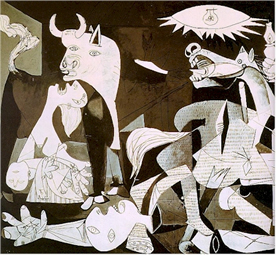
War & Peace
Unlike most of today's so-called democracies, the Athenian people (demos - all the men over the age of 18 whose fathers and whose mother's fathers had been Athenian citizens) had a direct vote on whether to go to war each year. They were not sent out to fight by presidents, prime ministers or other well-meaning folk, but they themselves made a simple choice. And most years they voted happily for war. Presumably they thought it was in their best interests to do so. Let us assume that the interests of ordinary people have not changed that much - in other words they hoped to profit personally from war (rather than having, say, idealistic notions of bettering the lot of those poor victims of Spartan tyranny).

Secondly, then, self-respect would have played a part. The poorest members of the society could make a contribution to their polis, as important or frequently more important than that of their social superiors - the small landowners who formed the hoplite class, fighting the battles on land as zeugitai (men yoked together) in their own armour (with a state-supplied shield).
Because the nautikos ochlos ("sailor rabble" in the Old Oligarch's memorable phrase) was in the majority, its wants took precedence over those of the farming class. You'll note that in Peace it is the farmers of Athens and the rest of Greece who want the war to end - they are the ones with something personal to lose - if not their lives in the fighting, their farms and their livelihood in the annual invasion of their land. Rowers - however much hardship they put up with in the triremes - would be much less likely to be killed or wounded. The trireme with its all-wood construction was unsinkable, and any casualties would probably be picked up: there was a scandal when some were left to drown after the victory at Arginousai in 406 BC. A show trial resulted in the demos holding all all ten of its generals responsible, and condemning them to death.
Then there was the influence of Cleon, "the tanner". Despite Aristophanes ridicule of him (he had personal reasons to hate him), he was not exactly a man of the people: he inherited a large-scale leather business from his father, and was doubtless doing very nicely out of it in wartime, with all the extra demands for leather that would have entailed. He had opposed Pericles' strategy of restraint, but the change - as I once heard it described - was from a Rolls Royce to a Jaguar leadership (you might need a knowledge of the British class system to understand that!). He had achieved military success at Pylos, by thwarting a Spartan peace bid. They were prepared to negotiate peace terms if the Athenians handed back their élite troops trapped on Sphacteria, but Cleon personally intervened and captured them, breaking the stalemate, and allowing the war to resume. He put through two populist moves - increasing the amount of tribute paid to Athens by her subject states (nominally her "allies"), and increasing the pay for jurymen from 2 to 3 obols (half a normal daily wage). The "jurymen" were all the citizens over 30 - and their pay for attendance at a lawcourt (hundreds could have been involved on any one day) was a kind of old age pension for those too old to serve in the fleet. His ruthless attempts to exploit the Athenian "empire" in the interests of the Athenians themselves also helped ingratiate him (such as his proposal to execute all Mitylenians after suppression of their bid for freedom in
Aristophanes, then, was no spokesman for democracy: his constituency was the farming class, and their superiors, the large landowners, the hippeis, or so-called Knights, who provided the cavalry in wartime (and who were his allies in the defamation of Cleon in his earlier comedy, Knights). Many of the richer citizens were also forced to provide cash from their personal fortunes to maintain the trireme fleet: there was no escape from the liturgy known as "trierarchy", where a wealthy citizen was held personally responsible for the equipment of and repairs to "his" trireme. No wonder that Aristophanes returns so regularly to the theme of peace in his comedies; it dominates Acharnians - his first surviving comedy, and returns of course much later in Lysistrata.
The Classics Pages are written and designed by
Comments, questions and contributions welcome.